

RCDSO CONNECT

Newsletter of the Royal College of Dental Surgeons of Ontario

FEATURE ARTICLE - Pages 12-15
RCDSO CONNECT
Message from the President and the Registrar & CEO
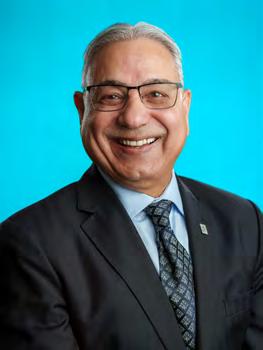
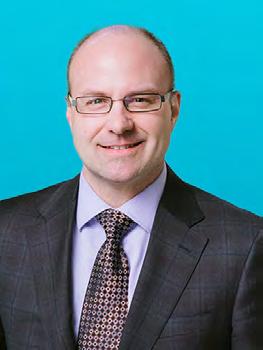
Dentists, as health care professionals, are dedicated to preserving and improving the oral health of both individuals and communities, while maintaining the confidence of their patients and the public. This important role hinges on each dentist’s personal and collective dedication to upholding high standards of professionalism. Our role as a regulator is to help ensure that Ontario’s dentists are able to practice at the highest level for patients. Through continuing education, standard review and the provision of practice advice, we work toward this every day.
Due to the inherent risks and conflict of interest in running a liability program and a regulatory agenda, in 2023, RCDSO Council directed staff to transfer the Professional Liability Program (PLP) to a third party. The PLP divestment project is well underway. After a competitive process, the College is now negotiating with a preferred party to sustain and build upon the PLP program. Over the past several months, with the assistance of merger and acquisition advisors, and the advice of a Councilappointed review group, we have been seeking a party who is committed to upholding the legacy of the program.
The cost of liability coverage will increase, based on market analysis, though it remains less expensive to practice dentistry in Ontario than in most other provinces. Regulatory fees will be frozen for 2026. There is an article on the subject later in this newsletter, but please attend RCDSO Connect sessions, read our email notices, and follow our social media channels to stay informed. Proposed bylaw revisions have been posted on our website here
Today and in the future, you will continue to receive the great service that has been the hallmark of the program since its inception. Your current coverage is not impacted and will continue throughout 2025. Registration for 2026 will also include PLP coverage, though the program will be managed by another organization. We are looking forward to telling you more about the provider as soon as possible.
Although the RCDSO Strategic Plan 2023–2025 is entering its final year, many of its initiatives will carry forward into the next. In the meantime, the profession can expect continued updates to standards of care, new guidance on accepting patients, insights into evolving practice models, and reforms to our governance and election processes. Also as part of the Strategic Plan, the College itself
Our role as a regulator is to help ensure that Ontario’s dentists are able to practice at the highest level for patients.
Dr. Harinder Sandhu, Chair and President Daniel Faulkner, Registrar & CEO
has begun work on its own reconciliation plan with Indigenous partners. All of these efforts are aimed at strengthening relationships with our community partners; supporting the culture of professionalism in dentistry; and consistently advancing the public interest.
With two new standards issued this year (Consent to Treatment and Prevention of Boundary Violations and Sexual Abuse) and more on the way, we encourage you to stay engaged with the College. A new draft standard (Managing Conflict and Ending the Patient-Dentist Relationship) was approved for consultation at our June Council meeting. Your views will be helpful as we refine the draft. We are currently reviewing the Dental CT Scanners Standard of Practice and are interested in understanding dentists’ views on the Standard of Practice. Feedback is most welcome and more information is available at Public Consultations
Consultations will continue on new standards and practice guidance through 2025 and 2026. Our goal is to provide considerable information, support, education and, where applicable, case studies, to make implementation as seamless as possible. Your advice and guidance is both welcome and critical to effective and informed application.
We have held a total of four RCDSO Connect Sessions so far in 2025 including, most recently, a session on the two new standards of practice and in June, on clear and ethical communication in dental care. These sessions, if watched live, are often Category 1 courses, when the content is deemed fundamental, necessary or advancing the profession in areas that are strategic priorities. There will be more sessions in 2025, including one in-person in Ottawa on November 6th
In Council news, Dr. Erin Walker was recognized by Schulich Medicine & Dentistry as one of their Alumni of Distinction. Dr. Erin Walker is a healthcare policy advocate, legal scholar, and practising dentist. At the RCDSO, she serves as Chair of the Inquiries, Complaints and Reports Committee and as a member of the Executive Committee. After almost five years of service, Council public member,
Cristina Cordiero has left our Council table. We are grateful for all of Cristina’s contributions to our mandate, most recently on the Registration Committee as well as the Inquiries, Complaints and Reports Committee. And finally, public member, Marc Trudell, Chair of the Finance Audit and Risk Committee has been appointed for another threeyear term. Marc’s insights have been invaluable on the Executive Committee and on the PLP divestment Procurement Review Group.
In June, Council spent time together working on a strategic vision for the College. As we near the completion of the 2023-2025 Strategic Plan, it made sense to consider our role in the ever-shifting regulatory landscape and the future of dental and oral health care practice in Ontario. The outcome of the work will be translated into a strategic plan by the College to drive our regulatory effectiveness and growth into the 2030’s.
Thank you for all that you do to keep your patients healthy and well.
Sincerely,
Dr. Harinder Sandhu and Daniel Faulkner

COUNCIL MEMBERS
Executive Committee
Dr. Harinder Sandhu, Chair and President
Dr. Nalin Bhargava, Vice President
Marc Trudell
Brian Smith
Dr. Erin Walker
Elected Representatives
District #1 Dr. Nalin Bhargava
District #2 Dr. Robyn Somerville
District #3 Dr. Peter Delean
District #4 Dr. Neil J. Gajjar
District #5 Dr. Daniel Fortino
District #6 Dr. Harinder Sandhu
District #7 Dr. Erin Walker
District #8 Dr. Osama Soliman
District #9 Dr. Antony Liscio
District #10 Dr. Deborah Wilson
District #11 Dr. Eilyad Honarparvar
District #12 Dr. Anthony Mair
Appointed By Lieutenant Governor in Council
Ram Chopra
James Colliver
Eleonora Fisher
Vivian Hu
Marc Trudell
Brian Smith
Roderick Stableforth
Judith Welikovitch
Nizar Ladak
Academic Appointments
Dr. Daniel Haas
Dr. Noha Gomaa


Next Council meeting
Next council meeting is September 18th, 2025. The meeting will livestreamed on our YouTube channel.
Questions? Reach out to:
Angie Sherban
Executive Assistant and Council Liaison phone: 416-934-5627 toll-free: 1-800-565-4591 asherban@rcdso.org
Council Highlights
Council Highlights are emailed out to members and posted online on the College’s website after each Council meeting. It covers some of the key highlights of Council business.
Read the Council Highlights from the March 27, 2025 Council Meeting
Read the Council Highlights from the June 19, 2025 Council Meeting






PLP divestment: What you should know

Due to the inherent risks and conflict of interest in running a liability program and a regulatory agenda, in 2023, RCDSO Council directed staff to transfer the Professional Liability Program (PLP) to a third party. It was determined, based on feedback from dentists, that a “turnkey” option is an ideal solution for divesting the PLP, as it:
1. allows the program to continue to operate as-is under separate ownership;
2. offers stability to Ontario dentists through the transition; and
3.is aligned with the public interest.
In a survey of registrants in 2023, dentists were clear that it was critically important to maintain the key value of the program—its service for dentists, level of coverage and tail coverage. Through this process, the






Materially
College has sought a partner committed to upholding the legacy of the program; providing expert service tailored to dentists for all members; and continuing its role in protecting the public.
To support a stable transition, the College will continue to collect an annual professional liability fee on a temporary basis. This will provide critical continuity during the transition, ensuring that all registrants will retain appropriate professional liability protection, and that all patients will be able to access compensation for damages.
Is there anything I need to do now?
No. Operations for PLP remain unchanged - it is business as usual. When you registered or renewed, your professional liability coverage was secured for the entire 2025 calendar year.
Offer coverage in the group model for

Provision of soft services to members (i.e., supporting dentists beyond the claims process)
Absorb and integrate PLP employees into the new program

PLP data sharing with the College post-transaction to support trend analysis in the dental profession
You will use the same process to register and renew for 2026, and your liability protection will continue to be offered through your registration. To support a stable transition, the College will continue to collect the annual professional liability fee on a temporary basis. This will provide critical continuity during the transition, ensuring that all registrants will retain appropriate professional liability protection, and that all patients will be able to access compensation for damages.
Ensuring stability for both patients and dentists remains our top priority throughout this transition. All new and existing PLP cases will continue to be handled as usual.
Dentists should continue to contact PLP directly for advice or assistance with potential, new or existing claims by emailing info@plpservices.org
Next steps: Liability Fee changes
Since 2023, the PLP cost estimate for the College has been maintained at a stable rate of $1,000, despite rising costs, liabilities and number of dentists to cover. The amount the provider will require for professional liability protection will be higher, resulting in the need for an increase in the professional liability fee
Proposed 2026 annual fee
for 2026 from $1,000 to $1,400 plus fees. The total liability fee will be $1,500. Regulatory fees for 2026 will be frozen.
Through market research on similar liability protection, $1,500 is a competitive and sustainable cost for this type of coverage. Fees for the practice of dentistry in Ontario are less than in most other provinces. For 2026, the regulatory fees will remain frozen at $2,170. Additionally, Council has proposed waiving the annual CPI increase of about $55.
Proposed by-law changes regarding fees have been posted for the required 60-day circulation period and will be brought to Council in September.
The College is committed to providing considerable notice and support to registrants regarding any required changes. More information will soon be available about the new provider and the benefits they offer.
To stay informed, please attend RCDSO Connect sessions, read our quarterly newsletter and email notices, and follow our social media channels for the latest information on changes to PLP. Please also reach out to practiceadvisory@rcdso.org
$2,170 regulatory fee for all RCDSO registrants (the same as 2025).
$1,500 ($1,400 + fees) fee for liability protection collected by the College on behalf of the new provider at market rate.
$3,670 TOTAL FEE

Liability fee stays consistent for the next 3 years.

RCDSO collects the total liability fee during renewal and remits it in full to the new provider. The College does not retain any portion of the fee.
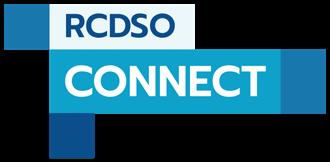
Virtual RCDSO Connect recap: April 2nd & June 11th
Clear, caring, and connected: Spring RCDSO Connect sessions focus on patient communication and updated standards
This spring, RCDSO Connect welcomed over 3500 combined attendees to two engaging online sessions that explored recent updates to the College’s Standards of Practice and the vital role of communication in dental care. These Category 1 sessions underscored the significance of upholding trust, professionalism, and clarity in each and every patient interaction.

Wednesday, April 2 highlights: Updated Standards on Consent and Professional Boundaries
RCDSO Council members Dr. Deborah Wilson and Dr. Anthony Liscio conducted a comprehensive session on the newly approved Standard of Practice on Consent to Treatment and Standard of Practice on Prevention of Boundary Violations and Sexual Abuse, both finalized by RCDSO Council at its March 27 meeting.
The session provided registrants with early insights into the rationale behind these updated Standards and how to effectively integrate them into their practice. Drs. Wilson and Liscio emphasized the responsibility of dentists to ensure that patients are informed and treated with respect and care, and how clear expectations regarding consent and boundaries protect both patients and practitioners.
Key Takeaways
Council approved both updated Standards on March 27, 2025, and they reflect the College’s ongoing commitment to patient safety and professional accountability.
The Standard of Practice on Consent to Treatment outlines clear expectations for obtaining and documenting informed consent at every stage of care.
The new Standard of Practice on Professional Boundaries helps dentists identify and prevent boundary violations and reinforces the importance of maintaining a respectful and professional relationship with every patient.
Practical examples during the session helped clarify how to apply these Standards day-to-day, especially when navigating complex or sensitive scenarios.

Wednesday, June 11 highlights: Clear Conversations –Strengthening Communication in Dental Practice
During an engaging fireside chat, two lawyers well versed in professional regulation and health law Ahmad Mozaffari and John McIntyre addressed communication pitfalls that can lead to complaints and breakdowns in care, as well as how to best avoid them. Drawing from real-world experience in professional regulation and health law, the speakers shared strategies for enhancing communication and protecting the dentist-patient relationship.
Standard of Practice on Consent to Treatment Standard of Practice on the Prevention of Boundary Violations and Sexual Abuse

Key Takeaways
Communication errors are a common factor in complaints received by regulators and can erode patient trust, even when clinical care meets expectations.
Dentists should practice active listening and clear, respectful dialogue to support informed consent and better health outcomes.
Ethical communication supports professionalism and minimizes misunderstandings that could impact patient safety or satisfaction.
Maintaining appropriate boundaries, being transparent, and involving patients in decisions about their care are essential for ethical and practical dental practice.
Looking Ahead: Fall 2025 RCDSO Connect Events
We look forward to continuing these important conversations in the fall. Upcoming virtual RCDSO Connect events are scheduled for: Wednesday, September 24, 2025 Wednesday, October 29, 2025
We’re especially excited to welcome registrants in person on Thursday, November 6, 2025, for a special RCDSO Connect event at the National Arts Centre in Ottawa. This in-person gathering will feature engaging conversations with leading experts and offer a unique opportunity to connect with colleagues face-to-face. We encourage you to save the date and stay tuned for more details, which will be shared soon.

Thank you to all who joined us this spring. If you missed a session or would like to revisit the material, recordings from RCDSO Connect are available on the RCDSO YouTube channel
Sedation and general anesthesia: Risks of malignant hyperthermia
What is Malignant Hyperthermia (MH)?
Malignant Hyperthermia (MH) is a severe reaction to certain drugs used for anesthesia. These drugs include certain volatile inhalational anesthetic agents (e.g. isoflurane, sevoflurane) and succinylcholine.
The severe reaction typically involves:
muscle rigidity, particularly in the jaw or masseter muscles
tachycardia
increased end tidal CO2 despite adequate ventilation
hyperthermia.
Hyperkalemia and acidosis are also diagnostic features. Without prompt treatment, the complications caused by a MH event or ‘crisis’ can be fatal.
Malignant Hyperthermia Susceptibility (MHS) is an autosomal dominant disorder which puts patients at a greater risk of having a MH crisis. Anesthesia providers are advised to ask patients if they have a known risk or family history of MH as part of their medical history review prior to treatment under sedation or general anesthesia.

How can an MH crisis be identified?
Early identification of an MH crisis is critical to successful management. Patients receiving volatile inhalation general anesthetics or succinylcholine as part of the sedation/anesthesia protocol must be continuously monitored for:
end-tidal carbon dioxide levels
blood oxygen saturation
body temperature.
Other indicators of an MH crisis include increased heart rate and muscle rigidity.
How is an MH event treated?
The main treatment is a drug called dantrolene sodium.
The College’s Facility Inspection Program requires all facilities using volatile inhalational general anesthetics or succinylcholine as part of the sedation/anesthesia protocol to have:
at least 36 vials of dantrolene (20mg each), or the equivalent (as recommended by the Malignant Hyperthermia Association of the United States (MHAUS))
sterile water to reconstitute the dantrolene before injecting it (2160ml is typically required)
As a patient safety and advocacy organization, MHAUS recommends all facilities where succinylcholine is administered carry dantrolene, without differentiating facilities where succinylcholine is used only as an emergency drug.
The College does not require facilities to carry dantrolene if succinylcholine is only used as an emergency drug. However, anesthesia providers are advised to review the MHAUS guidance and assess their practice needs.
Are there other precautions sedation providers should implement?
Facilities that use MH-triggering agents or treat patients with a known risk or family history of malignant hyperthermia are advised to:
have a written MH risk protocol
have a crisis management plan
run practice drills for handling MH emergencies
The MH risk protocol may include flushing all anesthetic equipment, in addition to having dantrolene available and an alternative nondepolarizing neuromuscular agent available, such as rocuronium, instead of succinylcholine.

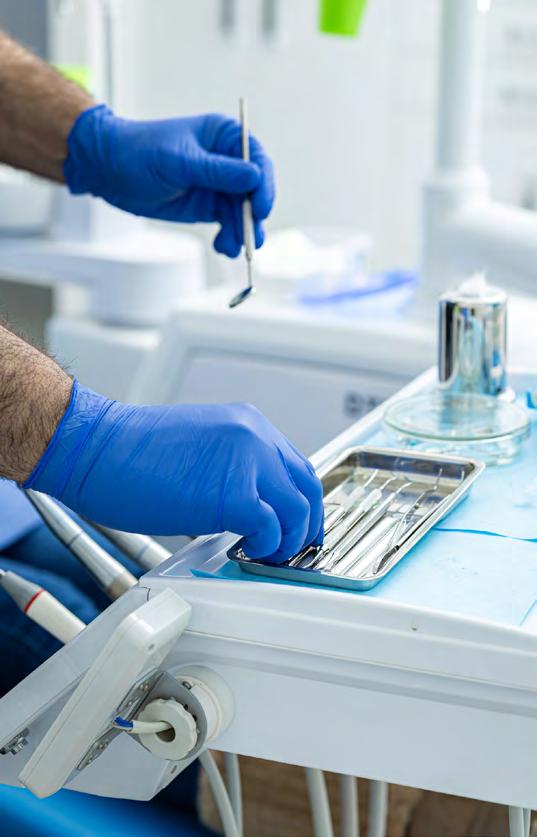
New Standard of Practice on Consent to Treatment
At its March 2025 meeting, RCDSO Council approved an updated Standard of Practice on Consent to Treatment. Obtaining informed consent for dental treatment is a legal requirement and a cornerstone of ethical practice.
This Standard outlines dentists’ responsibilities in ensuring that patients understand their treatment options and are empowered to make decisions about their care.

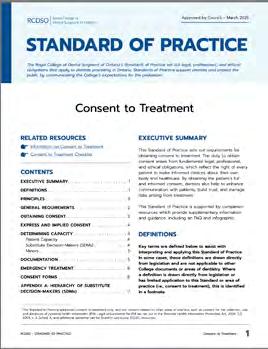
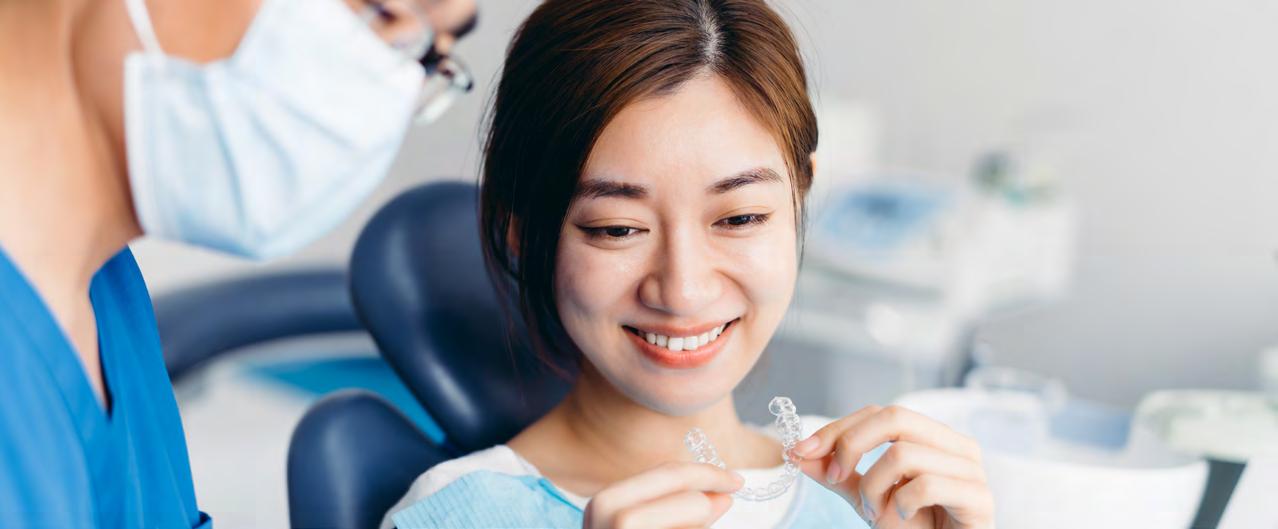
Here are key expectations and examples from the standard

Consent must be informed, voluntary, and ongoing
Patients must receive clear, understandable information about the nature, benefits, risks and alternatives of any proposed treatment.

Tailor communication to the patient
Consider language barriers, cognitive ability and cultural context

Consent is not a one-time event
It must be revisited if the treatment plan changes or if a significant amount of time has passed since the original discussion.
We encourage you to review the full standard and reflect on how it applies to your daily practice.

Use plain language
Avoid technical jargon. Find ways to describe treatment so patients understand the procedure, risks and potential outcomes.

Document the consent process
While written consent is not always required, documentation in the patient record should reflect the discussion and the patient’s decision.

Special considerations apply to minors and substitute decision-makers
Ensure you understand who is legally authorized to provide consent in these cases.
We have also created resources to help you interpret elements of the new Standard.
Consent to treatment checklist Frequently asked questions
Article:
New Standard of Practice on Prevention of Boundary Violations and Sexual Abuse
At its March 2025 meeting, RCDSO Council approved a new Standard of Practice on the Prevention of Boundary Violations and Sexual Abuse. The new Standard reinforces the need for safe, respectful and professional patient care.
Dentists hold a position of trust with patients. This standard outlines responsibilities in maintaining that trust and preventing any form of boundary violation, whether physical, verbal, emotional or digital.



Here are key expectations and examples from the standard

Maintain clear professional boundaries
Avoid overly personal conversations or relationships with patients. For example, do not discuss your personal life in detail or accept intimate gifts.

Be cautious with digital communication
Avoid casual or personal messages via text or social media. Keep all communication professional and related to care.

Avoid dual relationships
Treating someone with whom you have a close personal relationship (e.g., a spouse or close friend) can blur boundaries and should be avoided.

Communicate respectfully and clearly
Always explain procedures before beginning, especially when they involve physical contact. A simple explanation can prevent discomfort or misunderstanding.

Respond appropriately to boundary concerns
If a boundary is crossed, even unintentionally, acknowledge it and document the incident. Take steps to re-establish trust, e.g., if a touch is misinterpreted, apologize and explain the context.
We encourage you to review the full standard and reflect on how it applies to your daily practice.
We have also produced resources to help you interpret the new standard.
Case scenarios
Frequently asked questions
Request for assistance summary
May 9, 2025
Name: Tyrone Aaron COYLE
Date of birth: August 9, 1981
Addresses:
• 45 Topeka Rd, North York, ON M9L 1A3
• 214 Rue Notre Dame, Maniwaki, QC J9E 2J5
• 36 Rue Sainte-Marie #2, Gatineau, QC J8Y 2A3
Case #: 24-1885892
Detective Constable Peter Tutka, badge #9347
Toronto Police Service
Phone: 416-808-7411
Email: Peter.Tutka@tps.ca
May 15, 2025
Name: Ify OBIKANSI
Date of birth: March 1, 1987
Address: 10 Vena Way, Unit 219, Toronto, ON M9M 0G3
Case Number: 25-784912
Detective Constable Pickles, badge #11806
Toronto Police Service
40 College St, Toronto, ON M5G 2J3
Phone: 416-808-7411
Email: missingpersons@torontopolice.on.ca
May 13, 2025
Name: Michael SMITH
Date of birth: May 1, 1950
Address: 1283 Bayview Drive, Woodlawn, ON K0A 3M0
Case #: N/A
Danielle Chambers
Regional Death Investigation Administrator East Region – Ottawa | Office of the Chief Coroner
Phone: 613-249-0055
Email: occ.ottawa@ontario.ca
May 15, 2025
Name: Darryl Malcolm MELROSE
Date of birth: October 1, 1947
Address: 76 Victoria Ave S, Hamilton, ON L8N 2S7
Dr. Karen Schiff
Regional Supervising Coroner West Region | Hamilton Office 119 King Street West, 13th Floor, Hamilton, ON L8P 4Y7
Phone: 905-546-8200
Email: occ.hamilton@ontario.ca
May 20, 2025
Name: McKinley MANALANG
Date of birth: December 3, 1978
Unknown Address
Case Number: 25-719224
Detective Constable Mazzeo, badge #11664
Toronto Police Service
40 College St, Toronto, ON M5G 2J3
Phone: 416-808-7411
Email: missingpersons@torontopolice.on.ca
May 20, 2025
Name: Justin ARMSTRONG
Date of birth: November 11, 1992
Address: 7 Hawkridge Ave, Markham, ON L3P 1V8
Case Number: 25-790020
Detective Constable Reynolds, badge #7856
Toronto Police Service
40 College St, Toronto, ON M5G 2J3
Phone: 416-808-7411
Email: missingpersons@torontopolice.on.ca
May 26, 2025
Name: Elizabeth GILLMOR
Date of birth: May 5, 1973
Address: 1A-485 King Edward Ave, Ottawa, ON K1N 7N1
Acting Detective Sergeant | Badge #2238
Central Investigations | Ottawa Police Service
474 Elgin St, Ottawa ON K2P 2J6
Phone: 613-236-1222 × 5540
Email: GellerA@ottawapolice.ca
May 26, 2025
Name: Taron STEPANYAN
Date of birth: June 21, 1983
Address: 704 – 20 Chichester Place, Scarborough, ON M1T 1G6
Detective Constable Siu Mia NG | Badge #5420
Homicide and Missing Persons Unit | Toronto Police Service
40 College St, Toronto, ON M5G 2J3
Phone: 416-808-7411
Email: Siu-Mia.Ng@torontopolice.on.ca
May 30, 2025
Name: Juanita MIGWANS
Date of birth: December 18, 1993
Address: 17 Oak Hill Drive, M’Chigeeng First Nation
Case Number: RM24251640
Detective Constable Stephanie Recollet | Badge #13520
Manitoulin Crime Unit | Ontario Provincial Police
76 Centre Street, Espanola, Ontario, P5E1S4
Phone: 705-644-4441
Email: stephanie.recollet@opp.ca
May 30, 2025
Name: Merihit HAGOS
Date of birth: January 3, 2001
Address: 670 Parliament St, Unit #511, Toronto, ON M4X 1R4
Case Number: 25-787396
Detective McRae | Badge #7708
Homicide and Missing Persons Unit | Toronto Police Service
40 College St, Toronto, ON M5G 2J3
Phone: 416-808-7411
Email: missingpersons@torontopolice.on.ca
Answering your questions about non-controlled acts
As a registered dentist, I know that I can perform select “controlled acts” which cannot be delegated to staff. When I ask staff to perform non-controlled procedures for my patients, what does the RCDSO expect of me?
The Regulated Health Professions Act (RHPA) lists 14 “controlled acts”. Registered dentists can perform eight of the 14 acts but the Dentistry Act does not allow dentists to delegate those acts to anyone. This includes the communicating of a diagnosis to a patient.
In Ontario, registered dental hygienists (RDHs) can perform three specified controlled acts. Since dental assistants (DAs) are not regulated, they cannot perform any controlled acts.
When a dentist directs or assigns the performance of intra-oral procedures that are not controlled acts, the dentist is ultimately responsible. Only
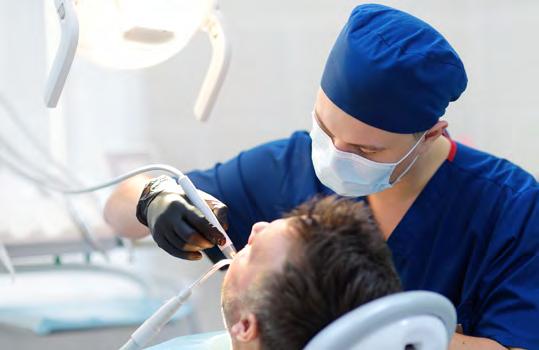
preventative DAs, Level II DAs, and RDHs can perform select intra-oral procedures. Even with the appropriate credentials, staff must have the requisite knowledge, skill, and judgment to perform the procedure.
Using dental radiographs as an example: dentists, RDHs, and Registered Medical Radiation Technologists (RMRTs) can take radiographs. other staff, including DAs of any level, must be HARP-certified to take dental radiographs.
For dental CT scans:
dentists must hold valid RCDSO CT member authorization and only in a dental facility with a valid dental CT scanner facility permit. RMRTs can only operate dental CT scanners under the on-site supervision of a qualified prescribing dentist (as per above).
RDHs, DAs, and other staff cannot take CT scans regardless of their training.
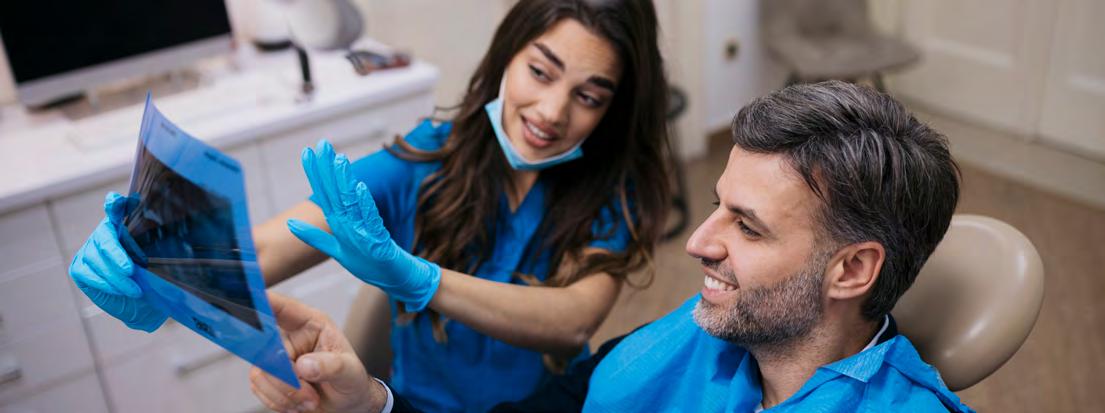
Please review the summary chart of intra-oral procedures (Appendix 3, page 10) which lists who can perform the procedure and what level of supervision they require.
Many procedures require that a dentist be on-site. Select procedures need dentist supervision via technology or presence in the office suite. Many procedures do not require a dentist’s supervision. That said, the dentist must still evaluate the level of supervision required based on the specific procedure and the circumstances under which it will be performed.
Dentists are responsible for ensuring that procedures are performed safely, competently, and with a patient’s informed consent. RCDSO requires that dentists ensure patients are informed of fees and charges before providing any treatment. Though staff may help to relay information about procedures to patients, it is the dentist’s
responsibility to ensure that informed consent is obtained before a procedure is started. These discussions must be documented in the patient record.
In many practices, staff are responsible for the billing of services (to the patient or the insurer). Remember, every dentist is responsible for the appropriateness and accuracy of billings and insurance claims to ensure they align with the actual care provided and are consistent with the ODA Fee Guide guidelines.
Have questions? Please contact:

Engaging with the Profession at the ODA Annual Spring Meeting
On May 8 and 9, the College was pleased to participate in the Ontario Dental Association’s Annual Spring Meeting (ASM).
As one of the largest dental conferences in North America, the ASM provides a meaningful opportunity to connect in person with dentists, students and other members of the profession. Thank you to the nearly 600 people who visited our booth! It was a lively hub drawing people eager to learn more about registration, continuing education, the facility inspection program, and other aspects of dental practice.
These conversations provide valuable insights into the questions and concerns facing the profession and help inform how the College can continue to provide relevant guidance and support. It also allows us to reflect on how we can best fulfill our mandate to protect the public while supporting the profession.

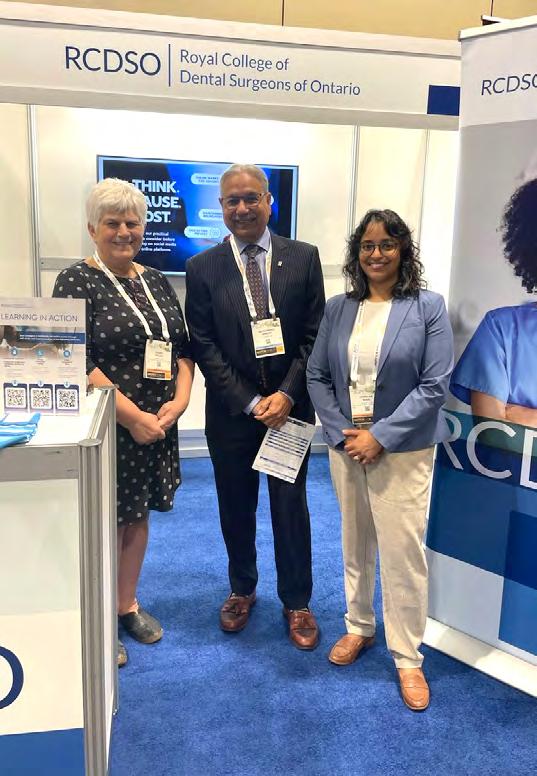
We are grateful to everyone who stopped by and look forward to connecting with even more of you at the 2026 ODA ASM!
Important: Measles preparedness memo and FAQs from CMOH
On June 18th, the College issued a bulletin addressing the ongoing rise in measles cases across Ontario. read the bulletin on our website

From left: Susan Taylor, Dr. Harinder Sandhu and Danielle Rodé.
Advancing access to care and strengthening inclusive dental care
The College is pleased to announce that the Canadian Society for Disability and Oral Health (CSDH) is now an Approved Sponsor under the College’s Quality Assurance Program. This designation allows CSDH to offer continuing education (CE) points for its courses, promoting inclusive and accessible dental care.

Insights from RCDSO Connect
CSDH’s approval follows the success of the RCDSO Connect event on February 4, 2025, Quantifying Disability: The CSDH Case Complexity Tool. The event featured insights from respected experts, Drs. Olaf Plotzke, Clive Friedman, Sharat Pani, and Dr. Daniel Haas. They shared valuable knowledge on: using decision-making tools to improve treatment planning.
applying the Dental Treatment Case Complexity Assessment Tool to assess patient needs. understanding sedation risk and planning safer, more effective care.

Continuing Education categories
Ontario dentists are required to earn 90 CE points over a three-year period, distributed as follows:
Category 1: Clinical courses approved by RCDSO’s Quality Assurance Committee and offered by an approved sponsor (e.g., CSDH).
Category 2: Clinical courses by approved sponsors, self-study with assessment, or mentoring.
Category 3: Non-clinical courses, practice management, and recorded webinars.

What this means for CSDH
As an approved sponsor, CSDH will: oversee course administration, attendance tracking, and knowledge assessment. provide CE certificates meeting RCDSO requirements. offer high-quality, practical education for dentists committed to improving access to care.
(For details on submitting a Category 1 course, refer to the Continuing Education Category 1 Course Submission Checklist or contact ce@rcdso.org.)

Why this matters
Ensuring equitable access to dental care is a top priority for the RCDSO. Many patients with disabilities encounter obstacles in receiving the treatment they need. Continuing education is vital in equipping dentists with the knowledge and skills necessary to provide inclusive care. With CSDH now recognized as an Approved Sponsor, more dental professionals can access high-quality education focused on enhancing care for patients with disabilities.
This milestone represents a significant advancement, supporting high-quality education while strengthening efforts toward creating a more comprehensive and equitable dental care landscape.

“ Get to know our staff: Auldwin Armstrong
Today, we are a comprehensive information and technology group.”
At the Royal College of Dental Surgeons of Ontario (RCDSO), our mission to protect the public and uphold excellence in dental care standards extends beyond clinical practice. Behind the scenes, the IT department plays a vital role in supporting the College’s mission to protect the public and uphold high standards in dental care by providing essential technological infrastructure and support.
Since joining the College in 2017, Auldwin Armstrong, IT Director, has led the department through a remarkable transformation. Under his leadership, the team has grown from a two-person operation to a group of ten skilled professionals. “When I joined the College the focus of the IT team was primarily supporting staff with basic technical needs. Today, we are a comprehensive information and technology group,” Auldwin shares.
The department operates across four specialized groups: service delivery, network and security, projects and application support, and records management. Each group contributes to maintaining the RCDSO’s technological and operational excellence. For instance, the network and security team not only safeguards the College’s data but also conducts proactive threat hunting and leads security awareness training. Similarly, the records management team has introduced cutting-edge systems for classifying and retaining digital and physical records.
One of the IT department’s most significant achievements came during the pandemic. “Before 2020, only three staff members were authorized to work remotely. Within a week, we transitioned the entire organization to remote operations—a monumental change in how the College functions,” Auldwin recalls. This seamless transition and the success of a fully remote workforce highlight the adaptability and commitment of the IT team.
A standout project from the IT department is The Bridge, the central contact and relationship management system of RCDSO. Described as “the hub of most of the College’s technological operations,” The Bridge centralizes data and processes for key functions, including renewals, complaints, and the RCDSO portal.
Looking ahead, the IT team is driving innovation with 42 projects planned for the year, ranging from system enhancements to new security measures and initiatives to improve operational efficiency. Each project reflects RCDSO’s unwavering commitment to public safety and excellence in dental care.
A particularly exciting area of exploration for the IT team is the potential integration of Artificial Intelligence (AI) into the College’s operations. This aligns with our recent research on AI in dentistry. “We’re in the very early stages of considering how AI might support our work,” Auldwin explains. The team is taking a cautious and deliberate approach, ensuring data security and compliance remain top priorities.
For more insights into the IT department’s initiatives, visit our website or refer to the RCDSO’s Annual Report 2023 for a detailed overview of the department’s activities and achievements.
NEW – For all dentists who register with the RCDSO after January 1, 2025
One of the requirements for all applicants to the RCDSO is the successful completion of a Jurisprudence and Ethics course and examination. Traditionally the course has not been recognized as part of continuing education because it is completed prior to registration.
The Quality Assurance Committee recently approved that dentists who register with the RCDSO for the first time after January 1, 2025 are eligible for five (5) points in Category 1 during their first continuing education cycle after registration. These points must be entered into their e-Portfolio in the first CE cycle and may not be carried forward to a subsequent cycle.

To enter the points into the e-Portfolio:
Activity Type: select “Category 1 (Core) Course”
Session date: enter your date of registration with the RCDSO
Under course name: enter “Jur” and select “Jurisprudence and Ethics – new registrant after January 1, 2025 – E-learning – 5 points”
Attendance Verification: follow the prompts and use your confirmation of registration as verification
Attestations (confirmations) to the College: confirm information is correct
Respond to feedback questions
Complete entry: “Save & Submit”

News from the Non-Insured Health Benefits Program (NIHB)
2025 NIHB dental fee updates
On April 1, 2025, the release of the 2025 NonInsured Health Benefits (NIHB) Program regional dental fee updates were synchronized across provinces/territories.
The updated fees appear in the NIHB Regional Dental Benefit Grids, organized by general practitioners (GP), specialists (SP), oral surgeons (OS), denturists (DN) and dental hygienists (HY). The grids contain maximum NIHB fees for eligible procedure codes.
The current NIHB Regional Dental Benefit Grids, as well as the latest updates, errata and amendments, are available on the Express Scripts Canada NIHB Provider and Client Website at nihb-ssna.expressscripts.ca/en > Provider > Dental. The Dental Benefit Grids can be found at nihb-ssna.express-scripts.
ca/en > Provider > Dental > Dental benefit grids
Upon entering the Dental Benefit Grids, choose the current year and the desired province/territory to view the grid corresponding to the applicable provider specialty (e.g., GP/SP, HY, DN and OS).

Claims submission period increased to 365 calendar days from date of service
Effective June 7, 2024, the claims submission period for dental providers increased from 30 calendar days to 365 calendar days from the date of service. This period applies to claims submitted by dental providers in real-time through Electronic Data Interchange (EDI) or through the Express Scripts Canada NIHB Provider and Client Website.
Please note that if a claim is submitted to Express Scripts Canada more than 365 calendar days from the date of service, the claim will be rejected. Also note that there has been no change to the process for submitting manual claims. Providers continue to have 365 calendar days from the date of service to submit their claim.
If you have any questions about the increased claims submission period or the eligibility of a claim, you may contact the NIHB Call Centre at Express Scripts Canada at 1 888 511-4666 Monday to Friday: 6:30 a.m. to 8:30 p.m., Eastern Time.
For more information on this change to the claims submission period, you may access the associated bulletin Claims Submission Period Increased from 30 Calendar Days to 365 Calendar Days on the Express Scripts Canada NIHB Provider and Client Website dental bulletins page (nihb-ssna.expressscripts.ca/en > Provider > Dental > Bulletins).
Learning in action

Earn Category 2 continuing education points through self-study and implementation of the following resources.

Consent to Treatment Prevention of Boundary Violations and Sexual Abuse
Review the standards and resources
Reflect on your practice
Identify and address any discrepancies



Using Antibiotics Wisely
Download the Choosing Wisely toolkit
Apply best practices in your clinical decisions

Case Complexity Tool
Integrate the Canadian Society for Disability and Oral Health Case Complexity Tool into your practice
Enhance patient care planning and risk management




A profession with purpose: Dr. Raj Khanuja (O.M.C., D.D.S.) on dignity, compassion, and transforming smiles through service
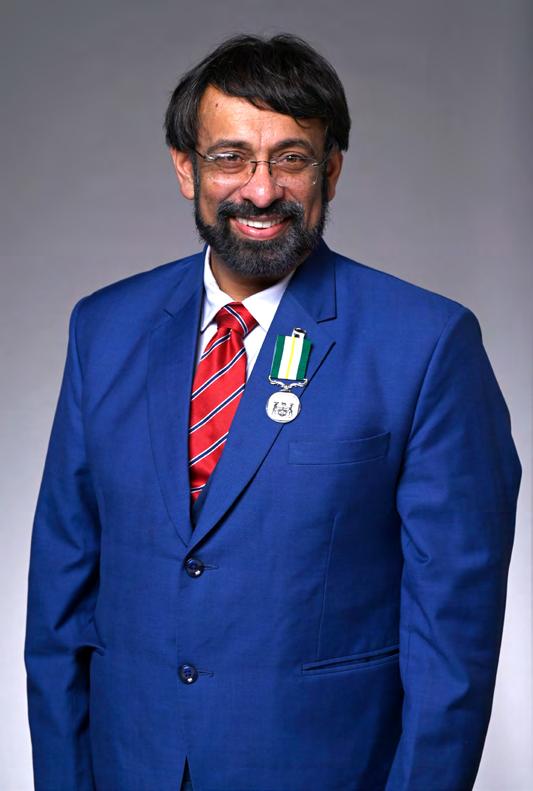
Because
when we choose to serve, we don’t just change the world –we elevate the profession, we uplift communities, and we become the very best version of ourselves.”
When Dr. Raj Khanuja learned he’d been awarded the Ontario Medal for Good Citizenship, his thoughts didn’t turn to recognition or ceremony. Instead, he reflected on the many people who had walked through the doors of his practice, often quietly carrying the weight of sacrifice and survival.
For Dr. Khanuja, dentistry is not just about fillings or fluoride. It’s about restoring dignity and helping people believe they deserve care.
He remembers early in his career treating a single mother who told him she had put off her own care so she could buy second-hand hockey equipment for her son.
“She said to me, ‘He deserves to play.’ That moment pierced something in me,” Dr. Khanuja explains. “It taught me that people don’t skip their care because they don’t value it. They sacrifice it for someone they love.”
That moment helped shape a calling. It planted the seed for “Doing Positive in My Backyard,” a simple yet powerful idea: to quietly uplift those around him, one patient at a time, one act of dignity at a time.
In 2012, Dr. Khanuja launched Free Dentistry Day at his practice in Brampton—a day dedicated to offering care at no cost and with no questions asked. Dozens of patients received essential treatment that first year, and the initiative has grown steadily ever since. Today, more than ten
dentists, hygienists, assistants, administrative staff, and suppliers have joined the effort, providing over $360,000 in free dental care to individuals who would have otherwise gone without. For Dr. Khanuja, it’s not just about restoring teeth – it’s about restoring confidence, hope, and dignity.
Among the many patients who have shaped Dr. Khanuja’s journey, Flo’s story stands out. She arrived at the clinic quietly, hoping for something simple yet profound: to smile in the photos at her daughter’s wedding.
Flo used a wheelchair and had no access to dental coverage. Her husband, gentle and devoted, brought her to every appointment. On one occasion, he was scheduled to be seen himself, but softly asked if his time slot could go to her instead.
“She’s waited long enough,” he said.
With care and urgency, her treatment was completed in time for the wedding. On her final visit, Flo smiled and said, “Now I can be in the pictures.”
It was more than a restored smile – it was a moment of dignity reclaimed. The free dental clinic had been her only path to care. Flo passed away in 2024, but the impact of her presence remains.
“I am honoured to have been a part of her journey,” Dr. Khanuja shares. “She reminds me every day that service is not measured in procedures, but in humanity returned.”
Flo’s experience became the heart of his e-book, Transforming Smiles, Restoring Dignity. Inspired by patients like her, he invites oral health professionals across Canada to join him in continuing this work.
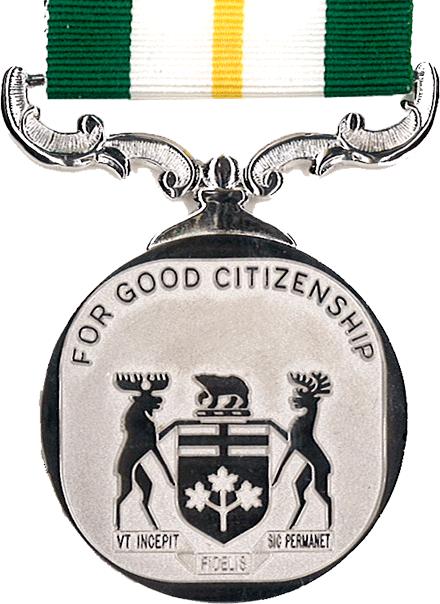
On October 10, 2025, he will launch National Dental Care Day – an initiative which calls upon all dental professionals across Canada to offer “just one day, one chair, one act of service” to those in need in their communities.
“If even a small number of us open our doors,” he says, “we can restore health and dignity to thousands. It doesn’t require perfection – just the willingness to act.”
This commitment to service is not one Dr. Khanuja carries alone – it lives within his family. His son, Rajvir, created the 100 Kms Walk Club, raising over $10,000 for hospitals by walking every long weekend in honour of healthcare workers. Alongside him was his sister, Rajsi, who supported each step of the way. Their quiet determination reflected a more profound truth: that acts of service are rarely solitary, they are shaped, encouraged, and sustained by those closest to us.
Outside his clinical and outreach work, Dr. Khanuja finds peace in life’s more reflective moments. Long walks near water, quiet tea shared with his daughter – these are the rhythms that keep him grounded. Amid the pace of practice and public service, they offer a return to purpose.
Because for him, purpose isn’t a finish line. It is something cyclical. A rhythm of giving, grounding, growing, and giving again.
And to those in the profession who feel the quiet pull to do more, his encouragement is simple: meet people where they are, and leave them better than you found them.
“Because when we choose to serve, we don’t just change the world – we elevate the profession, we uplift communities, and we become the very best version of ourselves.”
If you know a dentist or oral health professional doing meaningful work in their community, we’d love to hear about it. Please reach out to us at info@rcdso.org
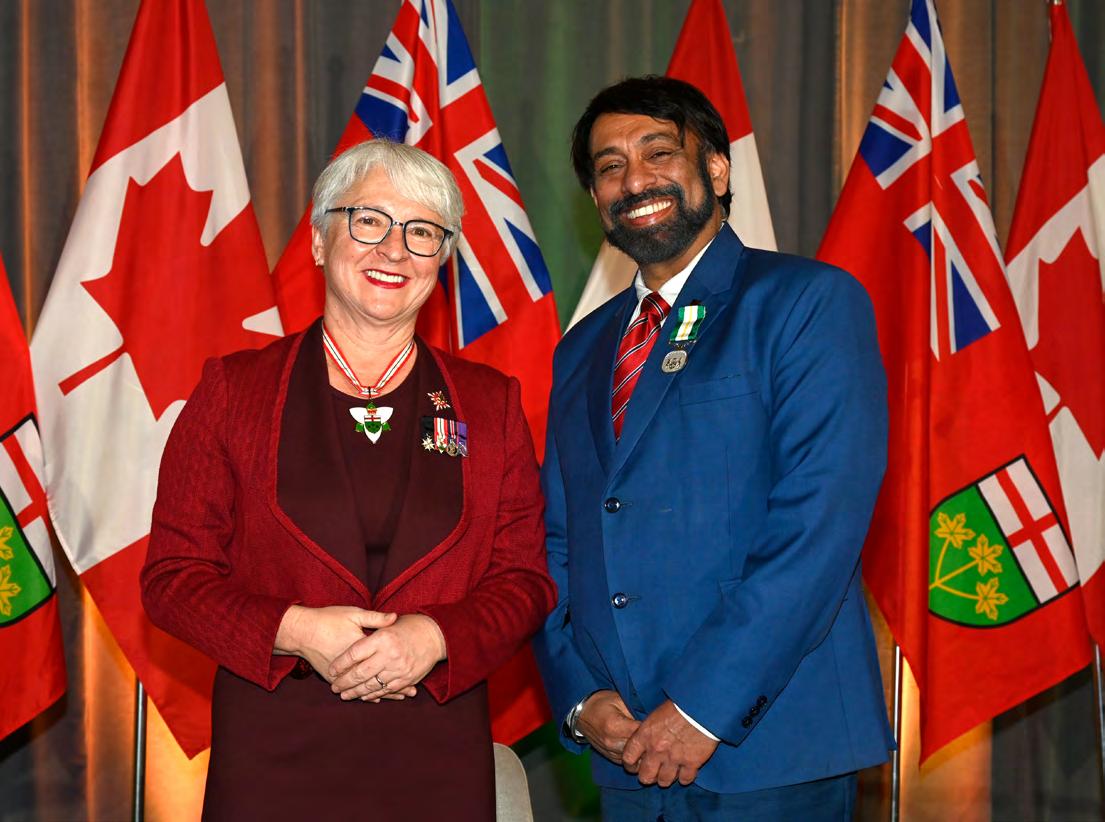
The Honourable Edith Dumont, Lt. Governor of Ontario (L) with Dr. Raj Khanuja (R)
Continuing education courses on trauma and violence-informed care
In March 2025, Council approved the new Standard, “Prevention of Boundary Violations and Sexual Abuse”. Provision #15 of the Standard requires dentists to provide care in a manner that assumes the possibility that a patient has experienced trauma and/or violence and is consistent with the principles of trauma and violence-informed care.
To support your continuing education in this important area, the following e-learning courses are available to take and earn CE credits for:
Oral Trauma Informed Care – Douglas College, 8 points, Category 2

Trauma and Violence-Informed Care
Foundations – University of British Columbia in partnership with EQUIP Health Care and Western University, 7 points, Category 2
Trauma-Informed Care (TIC) E-Learning Series –Alberta Health Services, 4 points, Category 2
Please also be sure to check the FAQ page for additional resources on incorporating a trauma and violence-informed approach to care in your practice.
INFORMATION SPOTLIGHT
HPC renewals are open from June 16 - August 31, 2025.
Renew your certificate in our RCDSO Portal by August 31st, 2025 to avoid revocation. If your HPC certificate is revoked, you will be required to apply for a new certificate of authorization at the cost of $750.00.
Take advantage of early renewal:
Fee if paid before July 31, 2025: $175
Fee if paid after July 31, 2025: $200
The new form enhances clarity and supports members in meeting the requirements of the Use of Sedation and General Anesthesia in Dental Practice Standard of Practice

The dos and don’ts of advertising
I am one of many dentists in Ontario and want to highlight my services or clinic.
What do I need to know?
Dentists must be mindful of how they present themselves to maintain the integrity and standards of the profession. They must also consider and protect the public interest.
The College has a practice advisory on Professional Advertising. It sets expectations for dentists as defined in regulations on professional misconduct.
What is an advertisement?
Materials related to your practice that are broadly defined and may include, for example, websites, newsletters, flyers, and bulletins.
They may be posted, published, displayed, or distributed to others in various modes or media formats.
The information may be from you, your clinic, your staff, or a third party acting on your behalf. It includes information for your oral health colleagues, patients, and/or the public.
They may also be subject to your obligations of Professional Use of Social Media if they extend beyond your clinic(s).
Who is responsible for advertisements?
Dentists are responsible for all advertisements involving them and their clinic(s).
Ask your staff to seek your approval before they post about you and/or your clinic.

If you have retained a third party to create your advertisements, consider sharing the RCDSO practice advisory with them.
Remember, you can contact practiceadvisory@rcdso.org and/or seek legal advice to help you align with the College’s and legal expectations.
Associate dentists also have a role to play in maintaining professional advertising.
Associates must influence and advocate for the professional advertising of the principal dentist and the clinic where they practice.
Associates must inform the principal dentist and/or clinic owner as soon as they become aware of any inappropriate advertising or misrepresentations. They should request that the information be updated and/or corrected.

Avoid using statements that are, or may be perceived as:
Unclear, untrue, misleading, and/or those that are not backed by fact or scientific evidence.
Claiming uniqueness or superiority in service (i.e. “#1 rated”, “cutting edge technology used”, “hires only top graduates”, “best at”).
Creating unrealistic expectations (i.e. risk-free care or guaranteed results).
Offering rewards, benefits, or other incentives (i.e. reduced rates, bonuses, or tiered programs).
Promoting the sharing of fees/fee-splitting or another benefit one may receive because of an advertisement. Remember, the College has published Guidelines related to Conflicts of Interest
Personal or professional references that use profanity or are disparaging or discriminatory of others (see Professional Use of Social Media).
What statements should I highlight in advertising? If your advertisement refers dental care or any procedure/treatment that is often performed by a specialist, you must clearly disclose whether you are registered with the College as a general practitioner or a specialist. If you are a specialist, you must identify with the specialty you are registered with.
PAUSE.




Respect your patients’ privacy and maintain their confidential health information.
Respect a patient’s boundaries and their right to choose the care they receive, and from whom.
Respect your office staff and professional colleagues in your advertisements and social media.

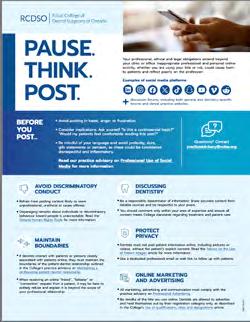

Respect oral health care providers outside of your practice or clinic. Online forums are not an appropriate way to address business disputes or concerns about others’ conduct, competence, or capacity.
If in doubt or have questions? Contact practiceadvisory@rcdso.org
INFORMATION SPOTLIGHT
CDCP: Coordination of HSO & ODSP government insurance benefits is possible
Patients with coverage under the Canada Dental Care Plan (CDCP) as well as Healthy Smiles Ontario (HSO) or the Ontario Disability Support Program (ODSP) can use benefits from both programs toward their dental care. HSO and ODSP will coordinate benefits for CDCP patients who are eligible. Additional information is available here, including examples demonstrating payer order. Dentists are encouraged to reach out to Accerta with any questions:
Email: info@accerta.ca
Phone: 416.922.6565, Toll-Free: 1.800.505.7430
Fax: 416.922.4323, Toll-Free Fax: 1.800.467.1839
CONSULTATION: DENTAL CT SCANNERS STANDARD OF PRACTICE
The Royal College of Dental Surgeons of Ontario (RCDSO) is currently reviewing its Dental CT Scanners Standard of Practice. RCDSO is interested in understanding dentists’ views on the Standard of Practice, as well as their experiences with using computed tomography (CT) and cone-beam CT (CBCT) scanning in their practices, including any challenges and barriers.
The current Standard of Practice sets out guiding principles for the use of dental CT scans, along with professional and clinical requirements for dentists requesting or prescribing CT scans. As part of our review, we want to ensure that the updated Standard of Practice reflects current best practices and developments in technology.
The consultation is open until Friday, August 1, 2025. Your feedback is important to us and will help
For patients with Ontario Works (OW) coverage, dentists should contact the patient’s local OW office for information on how the program may interact with CDCP.
For patients with coverage under the Ontario Seniors Dental Care Program (OSDCP), benefits will not be coordinated with CDCP. These patients must choose which program they wish to engage. Dentists are encouraged to discuss both options with their patients.
As a reminder, patients with private insurance are not eligible for CDCP coverage and thus there is no question of coordination of benefits. Claims should not be submitted to the CDCP for patients in this category.
inform updates to the Dental CT Scanners Standard of Practice. Feedback can be provided through the consultation survey on our website or by email at ctscannersconsult@rcdso.org.
CANADIAN DENTAL CARE PLAN UPDATES
As of May 2025, the Canadian Dental Care Plan (CDCP) has expanded to include eligible adults aged 18 to 64. Eligible individuals can apply for coverage, with benefits starting as early as June 1, 2025.
Canadians already enrolled in the CDCP should have renewed their coverage by June 1, 2025, to maintain their benefits. Those who didn’t will see their coverage end on June 30, 2025.
Visit Canada.ca/dental for more details.

UNAUTHORIZED DENTAL PRACTITIONERS
The RCDSO is committed to safeguarding public health by ensuring that only qualified and registered professionals practice dentistry within the province. In this regard, we publish a publicly accessible list of individuals who have been legally prohibited from practising for various reasons, including lack of credentials, disciplinary actions, or other legal issues.
If you are aware of these individuals or anyone else working without being registered with the RCDSO, please contact us at info@rcdso.org
Dentists should exercise caution when selling used materials and equipment to non-dentists. They may also wish to review the list of unauthorized practitioners available on our website

Always check the public register
Dentists should always verify the credentials of potential employees by consulting the RCDSO public register to ensure they are authorized to practice dentistry in Ontario. Before hiring anyone for your practice, be sure to cross-reference their license status on the public register to maintain compliance and patient trust. Patients are encouraged to check the register as well to confirm their dentist’s authorization to practice and ensure they are receiving care from a qualified professional.

Discipline
Reasons
Royal College of Dental Surgeons of Ontario v Kwong, 2025 ONRCDSO 1
Heard: February 11, 2025, by videoconference
Decision Date: February 11, 2025
Release of Written Reasons: March 31, 2025
Welcome new registrants
Murshid Shariq Muhammed Abdul Caader
Esraa Khaled Ahmed Moustafa
- Chesta
Nidhi Harsh Shah
Drashti Pareshkumar Kakadiya
Rinal Mukund Parmar
Haris Hussain
Natasha Cristina De Sa Lopes Velloso Perrella
Jeris Steven Galvez Castano
- Hanin Elmoiz Elsayed Abdelrazig
Aman Sharma
Amir Tavakoli
Ava Khatibshahidi
David Bonenfant
Leanne Dawn Easson
Daniel Cho-Kee*
Warren Foo Lun Wong
Claire Macaulay Jurgens
Tazeen Rahman
Prerna Suri
Danny Tse On Shum
Hamed Mohammed Hamed Al-Haddad
Zaid A Hadi
Yu Tong Feng
Marcelle Martins Belmiro
Bhawani Annpurna
Ramjot Kaur Ghuman
Yu Chen Yang
Harsha Narayankumar Lalwani
Pooja Rajachandran Vazhakkat
Noor Hussein Fadhel Al-Shabboot
Moiz Khan
Tang-Minh Nguyen
Mouhamed Dandan
Zaorong Jin
Kunal Rajeshbhai Patel
Jasmin Jasminder Dulay
Kourosh Rahimi
Shereen Mohamed Shokry**
Yasmine Ahmed Borno
Natalia Dumma-Shehaj
Deepali Ashwin Surve
Manita Kumari
Parisa Tadi
Christeen Grace Lim
Sara Mohamed El-Sabbagh
Jason Lee
Abdul El-Rabbany
Sonila Fejzulla
Mona El Sayed A Ahmed
Roupen Bekeregian
Kreena Girishbhai Patel
Syeda Butool Fatima Razvi
Firas Al Khatib
Ahmed M Kamel
Ravneet Kaur Jammu
Girija Dabas
Arun Garg
Pratibha Narang
Lilian Davtyan
Sucharita Ashokbhai Vishwakarma
Yasaman Rezaeifar
Hadeel Odeh Ahmed
Nasimsadat Jabbari Behnam
Krina Kishorbhai Vekaria
Bashar Faris Bahnam Tappouni
Lujane Gareiw
Gurpreet Kaur Brar
Namrata Viren Patel
Jessica Amanda Wanat
Pooja Falak Gajera
Fazila Adnan Bootwala
Leila Esmaeili
Safaa Naeim Fathy Ibrahim
Mohammed Yahya Abed Al-Jubory
Bahar Pouryosefi Kermani
Dinal Maheshbhai Ahir
Harleen Kaur Bamrah
Radhaben Prafulbhai Kakadiya
Aisha Khoja
Dimple Sapra
*Holds General licence since June 2014 and added Specialty licence on April 21, 2025.
**Previously held Education certificate from Oct 2019 to Oct 2020. Currently holds Specialty certificate since March 12, 2025.
